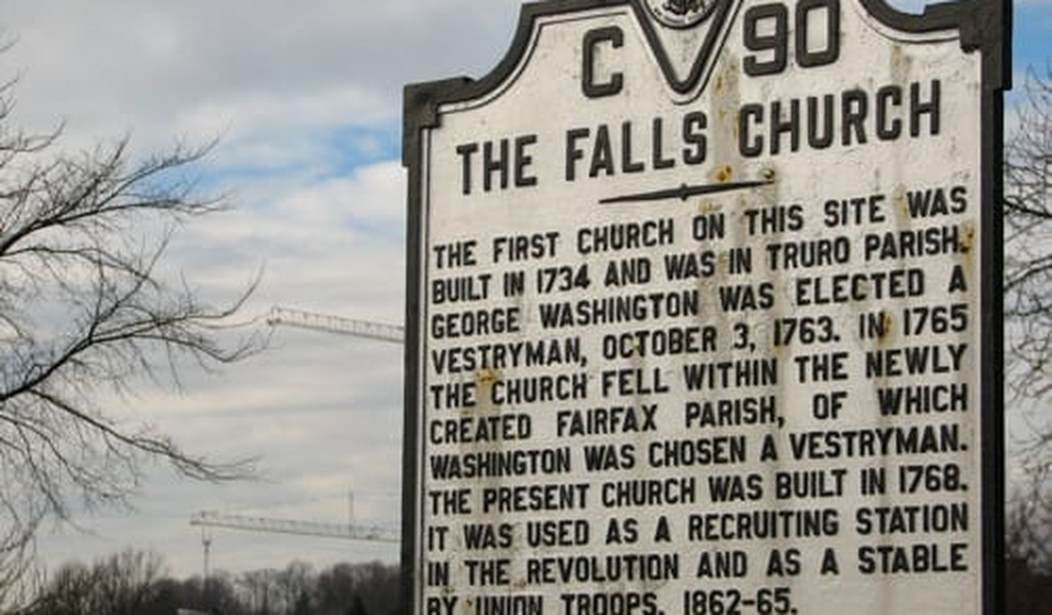Eight Virginia churches stand rather like Sir Thomas More once stood against an irrational and tyrannical edict from King Henry VIII. Henry demanded an oath that Englishmen accept Anne Boleyn as their legitimate queen and himself as head of the Church of England, an oath that ran counter to the Church’s definition of marriage, its existent structure, and to More’s conscience. More paid for his principled stand with his life on July 6, 1535, and England’s ties to the Catholic Church ended up dissolved. The church that Henry created in order to make his marriage “legal” now finds itself embroiled in a similar doctrinal civil war that, if the worst happens, could turn historic Virginia churches into mosques. One of those churches played a role in America’s own fight for freedom.
The town of Falls Church, VA, gets its name from the beautiful historic church at its heart. The Falls Church was built in the time of George Washington, who was himself a vestryman at the church, and the original chapel still stands amid a far larger and more modern campus, and today boasts about 2,500 members. According to a historical marker nearby, the Falls Church was a recruiting station for the fledgling army that Washington led. But today the Falls Church is the target of a scorched earth campaign that the Episcopal Church USA, now called The Episcopal Church (TEC) is waging against several of its own congregations.
The Falls Church’s differences with TEC began over doctrinal issues in the 1970s, but came to a head in 2003 with the Episcopal Church’s ordination of the first non-celibate gay bishop. Many Episcopal churches, including the Falls Church and seven others in northern Virginia, elected to separate from TEC and created a parallel church network aligned with the Anglican Communion. But TEC claimed ownership of the Falls Church’s sprawling campus, and a lawsuit soon followed to wrest the property away from the congregation. Claiming alienation of property, the Episcopal Church went to courtroom war against its breakaway flocks.
The TEC’s lawsuit against the eight churches hinges on property ownership: Who owns the buildings and lands where the congregations meet? What would seem to be a straightforward issue, isn’t, thanks in part to how Episcopal churches are governed. Episcopal churches exist somewhere between Catholic parishes, the properties of which rest solely in the hands of bishops, and most Protestant churches, which own their own properties independent of their denomination or larger structural organization. Unlike Catholic churches, Episcopal churches exercise some independence from the larger church and have the power to vote on whether to sever ties with TEC. These churches did just that. But unlike other Protestant churches, Episcopal churches exercise somewhat less independence from their larger church. But the deeds to the properties in question are in the names of the local trustees, not the TEC itself.
These churches also predate the founding of the Episcopal diocese in Virginia itself. In fact, they are among its founding churches. Falls Church itself dates back to 1734. The diocese that is suing it is three decades its junior.
Nevertheless, the Episcopal Church has continued to wage a very expensive war in court. Jim Oakes, chairman of the Anglican Division of Virginia, estimates that the case has cost the local churches and TEC between $5 million and $8 million on both sides, or between $10 million to $16 million total. For churches that exist to provide ministry to families and towns, those millions could have surely been put to much better use than hiring lawyers and engaging in legal proceedings that have now lasted five years.
As the years have worn on, the churches have offered to settle out of court at each stage, only to be rejected by the Episcopal Church, and then have prevailed over TEC in court. That changed when the case made it all the way to the Virginia Supreme Court, which handed the case back down to the circuit level after finding that the law at the heart of the case – called the division statute – did not apply in this case.
That trial is now set for the end of April, and is expected to take about six weeks. One Falls Church congregant I spoke with worries not just about the eventual ownership of the properties, but about the eventual intentions of the Episcopal Church itself. When I asked what was the worst case scenario, he pointed me to the outcome of a similar case in Binghamton, New York. The Episcopal Church’s victory over a breakaway church there led to this:
The Church of the Good Shepherd, which has stood at #79 Conklin Avenue since 1879, has been willingly turned over to a Muslim entity by the Episcopal Diocese of Central New York, rather than have it remain in the hands of traditional Anglicans who practice the faith once for all delivered to the saints.
The death knell for the structure as a Christian house of worship was delivered on February 9, 2010, when it was sold to Imam Muhammad Affify, doing business as the Islamic Awareness Center, for a mere $50,000, a fraction of the church’s assessed $386,400 value.
Now, two months later, the classic red Anglican doors have been repainted green, the simple cross on top of the steeply peaked bell tower has been lopped off, and a windowpane cross in the side door has been disfigured leaving only narrow vertical glass with the cross beam being painted over to hide it. The Muslims consider the cross a pagan symbol.
Meanwhile the Rev. Matt Kennedy, his wife and partner in ministry Anne, their young family and congregation were sent packing in the bitter cold and deep snow in January 2008 when the New York Supreme Court ordered them to relinquish the 130-year-old church building which stands overlooking the meandering Susquehanna River.
Good Shepherd had offered to purchase the property before any legal proceedings began, but TEC refused, just as it has refused to settle with the majority of the Virginia churches. After winning the Binghamton suit, TEC sold the historic church to the Islamic group for about a third of what the congregation had offered.
In a strange new twist on the church lawsuits, TEC just this week settled with a breakaway church in Leesburg, VA. The terms of that settlement, though, allow the church to lease back its property from TEC but forbid the church from affiliating with the Anglican Communion or any other affiliated group, and no bishops may visit the church without TEC’s permission. So the breakaway isn’t really a breakaway: TEC is still in effective control. Freedom of conscience and association are the casualties. Or as one commenter put it, freedom is granted except for the chains. And add to that, this:
Presiding Bishop Katharine Jefferts Schori is on record saying she would sooner see fleeing parishes sold for saloons than see them affiliate with African and Southern Cone dioceses that uphold “the faith once delivered for all to the saints.”
Saloons rather than traditional churches? That is why the word “jihad” is in the title of this article. The Episcopal Church’s actions in Binghamton and elsewhere defy reason, unless they were intended to send a very strong and unmistakable message to traditional congregants who might be thinking of breaking away: Defy us, and we will not only hound and possibly crush your congregation through expensive lawsuits, we will see that your cherished houses of worship are desecrated. And we will go to any lengths to send this message, even if we must turn your houses of worship into saloons, or mosques. Even if George Washington himself once worshiped there.










Join the conversation as a VIP Member